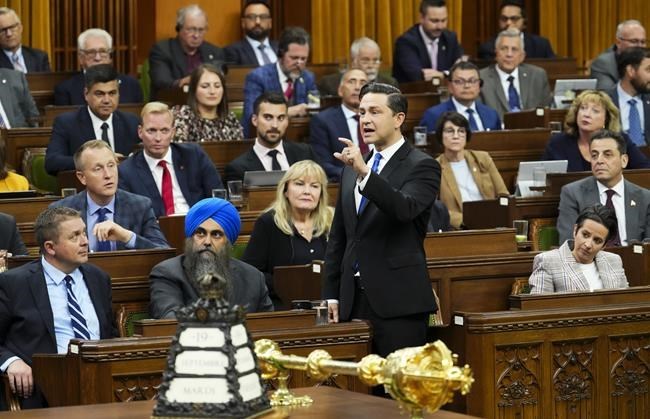OTTAWA — Conservative Leader Pierre Poilievre introduced a private member's bill in the House of Commons Wednesday that outlines a plan to address the national housing crisis.
The bill, which is unlikely to pass, centres around using federal infrastructure and transit spending to push cities to build more homes.
It proposes requiring cities to increase home building by 15 per cent each year to receive their usual infrastructure spending.
Cities that fail to meet that target would see a decrease in the federal dollars they receive, while those that exceed it would get additional money.
Funding for transit projects would also only be given to cities when high-density housing is constructed and occupied around transit stations.
Housing experts, advocates and industry groups generally agree that municipalities place many barriers to new developments, and city councils are often swayed by anti-development sentiment.
For Poilievre, tying federal funds to housing results at the municipal level is the central way to address the housing crisis.
The Liberals are also planning to use federal funds to push cities to build more homes through their recently launched Housing Accelerator Fund. That fund, however, only gives cities additional money and doesn't involve withholding money from cities.
While introducing his bill in the House of Commons on Wednesday, Poilievre characterized the Liberal fund as more bureaucracy.
"(Trudeau's) got a program that will add even more bureaucracy has taken a year and a half to make its first announcement and it hasn't built a single home," Poilievre said.
He contrasts that with his plan, which offers a "simple mathematical formula" to reward — or punish — cities.
"It is common sense of the common people," Poilievre said.
The Conservative proposal would reallocate $100 million from the Housing Accelerator Fund to give additional money to communities that greatly exceed the housing targets.
Conservatives have explained that the bill would also give Canadians the ability to complain to the federal government about municipalities standing in the way of new developments, creating a new federal complaint process. The federal government would then withhold additional funding if the complaint is legitimate.
Murtaza Haider, a professor of data science and real estate management at Toronto Metropolitan University, said he generally likes the Conservative approach of limiting government bureaucracy and singling out cities as "gatekeepers" who are blocking developments.
"What Pierre Poilievre is offering is the typical right-wing thinking where they think that less government is better. And I am of the view that perhaps that is the preferred mode that we should be thinking about," Haider said.
While he applauded the idea of giving extra funding that's tied to housing results, Haider cautioned against cutting infrastructure spending for cities that don't meet the targets.
"I find troubling that they would (withhold) infrastructure funding for municipalities (if) for one reason or the other, they are unable to meet the target," Haider said. "I think this is going a little too far."
Haider said withholding funding could lead to even bigger housing shortages, if cities aren't able to move forward with necessary infrastructure projects.
"I believe that at the end of the day, the feds should always be there for necessary infrastructure, irrespective of what happened in the housing file," he said.
The bill also proposes removing GST charges off rental developments that offer below-market rent prices, which stands in contrast with the Liberals' plan to remove the tax off all rental developments.
Carolyn Whitzman, a housing expert and adjunct professor at the University of Ottawa, said she supports using both carrots and sticks to incentivize cities to build more homes.
But she said limiting the GST exemption to below-market rental developments would add an unnecessary layer of complexity.
"I'm sorry to say that GST is not the place where I would put on the layer of bureaucracy," she said.
Whitzman also noted the absence of a plan to address the need to drastically increase the stock of social housing.
Below-market rentals, she said, would not necessarily be affordable enough for those who need deeply affordable housing.
"We haven't heard anything on non-market housing. We haven't heard anything on supportive housing, we haven't heard anything on long-term care. We haven't heard anything on the kind of housing that is most in need at the moment," Whitzman said.
Scotiabank released a report early this year calling for doubling the social housing stock in the country in order to bring it in line with the OECD average.
Other tenets of the plan include selling off 15 per cent of federal buildings and land for housing development, and going after bonuses and compensation of executives at the Canada Mortgage Housing Corp. for delayed approvals and missed home-building targets.
This report by The Canadian Press was first published Sept. 20, 2023.
Nojoud Al Mallees, The Canadian Press




